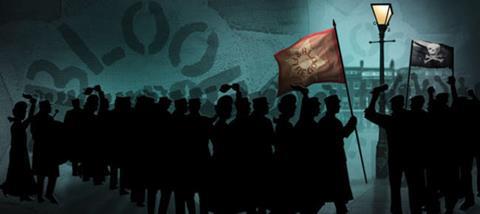
The troubles began in 1879 after William Booth changed the name of his Christian Mission to The Salvation Army and his followers started wearing a quasi-military uniform. Salvationists were assaulted on the streets and inside their places of worship.
One of Booth’s strategies was that if people wouldn’t – or through lack of smart suit or a good wash – couldn’t get to church then the church must go to them.
The street meetings Salvationists held in the roughest parts of town attracted large crowds. Some gatherings were broken up by flying bricks; others by the officer being arrested (and later imprisoned) for obstructing the highway.
The Army targeted those who sought solace in drink, offering them a better lifestyle through faith in Christ. Hundreds responded to the gospel and saw their lives transformed. Publicans and brewers were hit where it hurts – the pocket.
Basingstoke
After the Salvationists achieved great success in Basingstoke and won heavy drinkers to Christ, publicans began to complain. On Sunday 20 March 1881, a 1,000-strong brewery-financed gang called the Massagainians clashed with Salvationists in the Battle of Church Square.
The Salvationists received a severe beating – blood, black eyes and broken bones.
William Booth wrote to the Home Secretary, asking for police protection and for the magistrates to deal with perpetrators. His case was not helped by the fact that a number of magistrates, in Basingstoke and elsewhere, were connected to the drinks industry.
Exeter
Organised opposition soon intensified. In Exeter the Skeleton Army was birthed. Described by the press as ‘roughs’, they were lads who let their fists do the talking.
For more than a year, the Skeletons attacked the Salvationists of Exeter on the streets and at their hall. Stones were thrown and windows of churches smashed. Skeletons tried to storm the hall during worship services. The Salvationists repelled them.
Weston-super-Mare
In Weston-super-Mare, the Skeleton Army announced itself with a riot. Salvationists were injured, their instruments battered and their flag stolen.
The town’s mayor banned Salvationists from assembling on the streets. Captain William Beatty refused and was arrested. At his trial, Beatty was found guilty of ‘unlawfully and tumultuously assembling with others to the disturbance of the peace’ and was sentenced to three-month’s imprisonment.
Beatty appealed and won. Salvationists were free to march the streets. The case (Beatty v Gillbanks) established a legal precedent that is still in force today – that a lawful act cannot be made unlawful by the actions of others.
Worthing, Eastbourne, Hastings
In 1884, the Skeleton Army launched a full-frontal attack on south coast resorts.
On Sunday 17 August, Skeletons attacked Worthing Salvationists as they marched to their hall. A fight between the police and Skeletons followed and a number of Skeletons were arrested.
Three days later, a mob attacked the home of shopkeeper George Head, landlord of the Salvationists’ hall. With no police protection, Head fired his revolver into the crowd, injuring three rioters.
The next day, the magistrates called in the troops. That evening, the Skeletons paraded the streets, smashing the town hall and police station windows. The Royal Irish Dragoon Guards lined up in front of the town hall. After a 90-minute stand-off, for the only time in Worthing’s history, the Riot Act was read and the mob dispersed.
In response to similar disturbances, MPs in Eastbourne and Hastings put forward localised legislation to prohibit processions with music on Sundays.
Torquay
In 1888 there were similar prohibitions on processions in Torquay. But William Booth sent his daughter, Eva, to march with Salvationists in defiance of the law.
In May, Eva and 18 other Salvationists appeared in court. For fear of adverse publicity, Miss Booth was not punished. My great-great uncle, Frank was among those sent to prison.
The Skeleton War
From 1881 to 1893, the Skeleton War saw fighting in 67 towns and villages, mainly south of the Midlands. During this period, barely a week went by without a press report of an attack on The Salvation Army.
Despite brutal opposition, during this period The Salvation Army opened 1,200 new centres in the UK. It also expanded globally to 23 countries.
The full story of how early-day UK Salvationists faced and overcame opposition at the hands of the Skeleton Army is told in Blood on the Flag (Shield Books) by Major Nigel Bovey.
To hear more from Major Nigel Bovey, listen in to Premier Christian Radio from 7am on Wednesday.


























